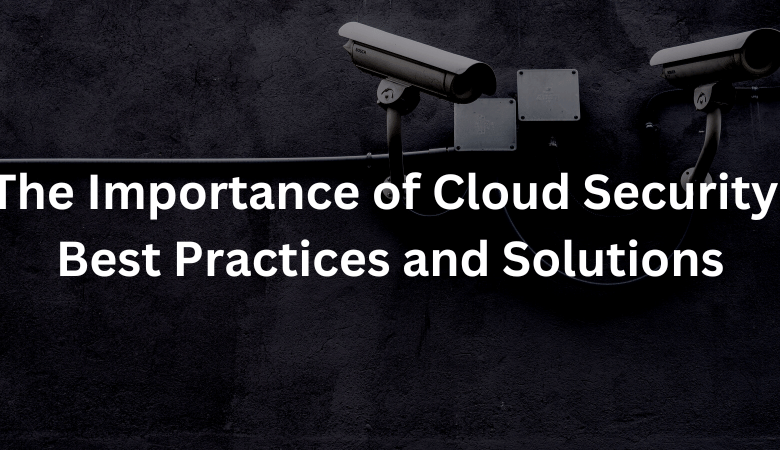The Importance of Cloud Security: Best Practices and Solutions

Cloud security is a big concern for businesses of all sizes. In this article, we will explore best practices and solutions for securing your cloud-based data.
1) The Importance of Cloud Security Best Practices and Solutions
As more and more businesses move to the cloud, it’s important to be aware of the security risks that come with it. While the cloud can offer many benefits, including increased flexibility and scalability, it also introduces new security challenges.
That’s why it’s important to implement cloud security best practices and solutions. By doing so, you can help protect your data and applications from potential threats.
Here are some of the key cloud security best practices and solutions to keep in mind:
1. Use a trusted cloud provider: When it comes to cloud security, not all providers are created equal. Be sure to do your research and choose a provider that offers robust security features.
2. Implement multi-factor authentication: Multi-factor authentication (MFA) adds an extra layer of security by requiring users to verify their identity using two or more factors. This can include something they know (like a password), something they have (like a phone), or something they are (like a fingerprint).
3. Encrypt your data: Encryption is a critical security measure that helps to protect your data from being accessed by unauthorized individuals. When data is encrypted, it is converted into a code that can only be decrypted by someone with the proper key.
4. Use a VPN: A virtual private network (VPN) can help to keep your data safe when you’re working remotely. A VPN creates a secure, encrypted connection between your device and a server, making it more difficult for hackers to intercept your data.
5. Keep your software up to date: Outdated software can be a security risk, as it may contain vulnerabilities that can be exploited by attackers. Be sure to keep your software up to date and install security patches as soon as they’re available.
By following these best practices, you can help to keep your data and applications safe in the cloud.
2) Best Practices for Cloud Security
Cloud security is a top priority for businesses of all sizes. The cloud has become the new normal for businesses, with more and more companies moving their data and applications to the cloud.
However, with the increase in cloud usage comes an increase in cloud security risks. Businesses must be aware of the potential security risks associated with the cloud and take steps to mitigate them.
In this blog post, we will discuss two best practices for cloud security:
1. Use a multi-cloud strategy
2. Implement a comprehensive security solution
1. Use a multi-cloud strategy
A multi-cloud strategy is a cloud computing strategy that uses multiple cloud vendors. This can include using different vendors for different applications or using different vendors for different regions.
There are several benefits to using a multi-cloud strategy:
– Improved security: By using multiple vendors, you can reduce the risk of a single vendor being compromised.
– Increased flexibility: You can choose the best vendor for each application or region, based on your specific needs.
– Increased availability: If one cloud vendor goes down, you can still access your data and applications from another vendor.
2. Implement a comprehensive security solution
A comprehensive security solution should include the following components:
– Identity and access management: This ensures that only authorized users can access your data and applications.
– Data encryption: This protects your data in transit and at rest.
– Data loss prevention: This prevents sensitive data from being leaked outside of your organization.
– Intrusion detection and prevention: This detects and prevents malicious activity on your network.
– Disaster recovery: This ensures that you can recover your data in the event of a disaster.
Conclusion
Cloud security is a top priority for businesses of all sizes. By using a multi-cloud strategy and implementing a comprehensive security solution, you can reduce the risks associated with the cloud.
3) Cloud Security Solutions
As our lives move increasingly online, the importance of data security becomes more and more apparent. Personal information, financial data, and sensitive business information are all at risk of being accessed and used without our permission. And with the rise of cloud computing, the need for effective cloud security solutions is more important than ever.
There are a number of different cloud security solutions available, each with its own advantages and disadvantages. The best solution for your business will depend on a number of factors, including the type of data you need to protect and the level of security you require.
1. Data Encryption
One of the most effective cloud security solutions is data encryption. This involves converting data into a code that can only be decrypted by authorized users. This means that even if someone does manage to access your data, they won’t be able to make sense of it unless they have the key to decrypt it.
2. Identity and Access Management
Another important cloud security solution is identity and access management (IAM). This is a system that controls who has access to your data and what they can do with it. IAM can be used to restrict access to specific files or folders, and can also be used to track user activity and identify possible security breaches.
3. Virtual Private Networks
A virtual private network (VPN) is another effective solution for protecting data in the cloud. A VPN creates a secure, encrypted connection between your devices and the server, which makes it much harder for anyone to intercept and access your data.
Choosing the right cloud security solution for your business can be a daunting task. But with a little research, you should be able to find a solution that meets your needs and provides the level of security you require.
4) The Benefits of Implementing Cloud Security Solutions
As organizations increasingly move to the cloud, it’s important to consider the security implications. Cloud security is a shared responsibility between the customer and the service provider. The customer is responsible for securing the applications and data they put in the cloud, while the service provider is responsible for securing the cloud itself.
There are many benefits to implementing cloud security solutions, including:
1. Increased security: One of the main benefits of cloud security solutions is that they can provide increased security for your data and applications. This is because service providers have the resources and expertise to invest in strong security measures.
2. Reduced costs: Another benefit of cloud security solutions is that they can help reduce costs. This is because service providers can spread the cost of security measures across all their customers.
3. Improved compliance: Cloud security solutions can also help improve compliance with regulations and industry standards. This is because service providers can offer features that help customers meet compliance requirements.
4. Increased flexibility: Finally, cloud security solutions can also increase flexibility. This is because customers can choose the level of security they need and can scale up or down as their needs change.
Overall, there are many benefits to implementing cloud security solutions. By doing so, organizations can increase security, reduce costs, improve compliance, and increase flexibility.




